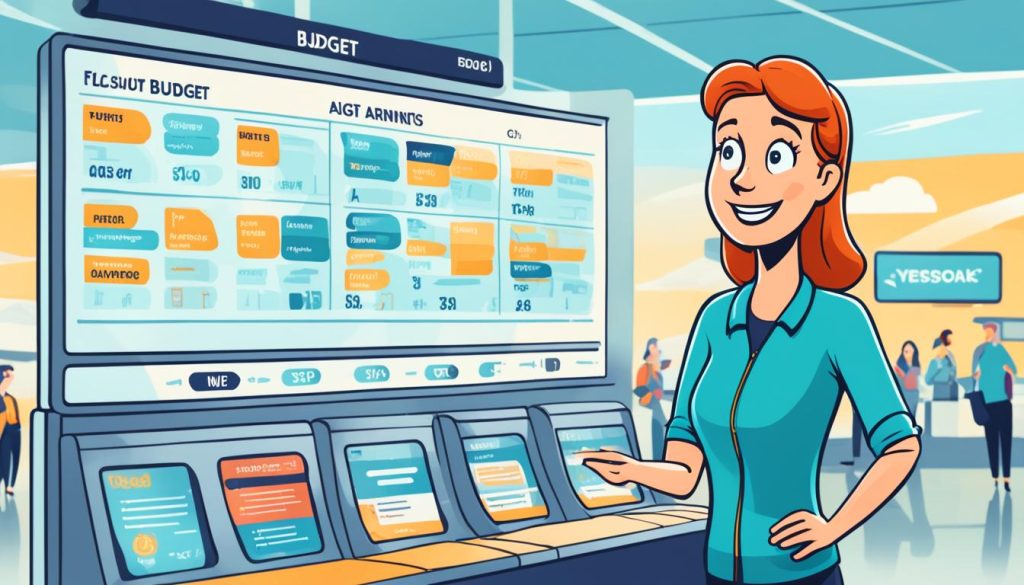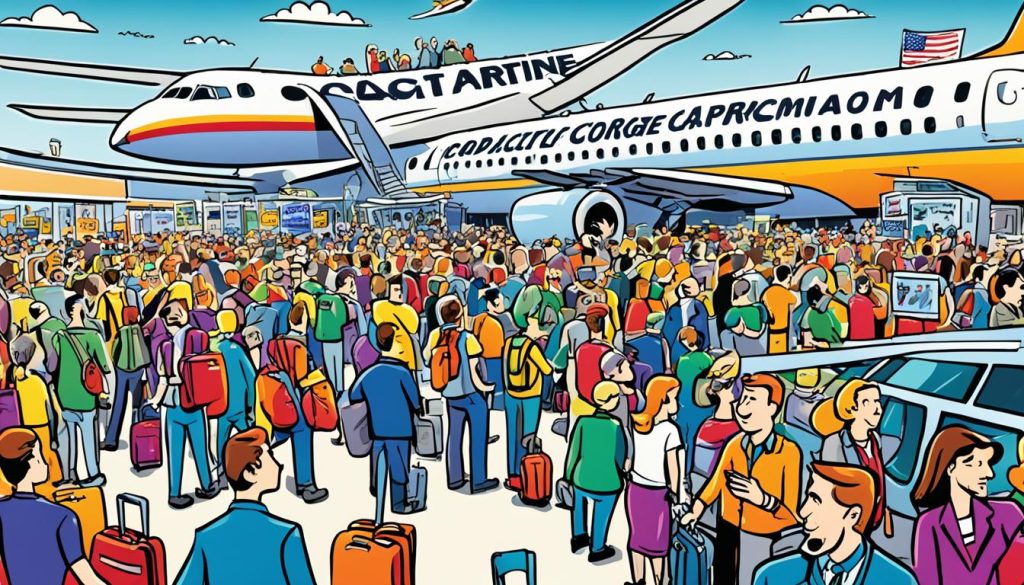Budget airlines have changed how we travel, making flights cheaper for more people1. But, these low prices often mean extra costs for things like bags, seat choices, and in-flight services. It’s important to think about the savings versus the hassle to see if budget airlines fit your travel plans.
This article will look into the good and bad of budget flying. We’ll give you tips and insights to make smart choices about your air travel. You’ll learn about budget airline pricing and how to deal with their fine print.
Key Takeaways
- Budget airlines have made air travel more accessible, but often come with hidden fees and reduced services.
- Carefully consider the total cost of your trip, including additional fees, when booking with budget airlines.
- Research airlines and routes to find the best balance between cost and convenience for your travel needs.
- Be prepared to sacrifice certain amenities and flexibility when flying with budget carriers.
- Understand the airline’s terms and conditions to avoid unexpected charges or hassles during your trip.
Understanding Budget Airlines
Budget airlines, also known as ultra-low-cost carriers (ULCCs), have made a big impact in the airline world. They offer fares much lower than traditional airlines like American, Delta, and United2. But, they make up for it by charging extra for things like checked bags, carry-on luggage, seat choice, and snacks and drinks on the plane.
What Are Budget Airlines?
Budget airlines, or ULCCs, focus on saving costs to give you super low fares. They cut down on services to keep prices low3. This approach might not be for everyone, but it’s great for those looking for the cheapest flights.
Comparing Budget, Low-Cost, and Legacy Carriers
Between budget and legacy airlines are low-cost carriers, like Southwest and JetBlue. They offer more services than ULCCs but charge more than traditional airlines3. Knowing the differences between these types helps you pick the best flight for your needs and budget.
Budget airlines, such as Frontier and Spirit, have very low base fares but add many fees when you book3. Traditional airlines usually have simpler baggage fees, seat choices, and policies on changes or cancellations3.
To make a budget airline flight a good deal, be flexible with your bags and seat, do your own check-ins, and compare the total cost2. By keeping these tips in mind, you can find great deals on affordable flights.
“I started flying on budget airlines in 2015, and I’ve booked one-way flights for as little as $15 with airlines like Frontier. I’ve flown to Iceland for less than $300 and from Philadelphia to West Palm Beach for a total of $38 round trip, while traditional airline tickets for similar routes were around $500.”
– Catherine Smith, Budget Airline Enthusiast4
Potential Savings and Hidden Costs
Budget airline ticket prices can be tempting. Airlines like Allegiant and Spirit offer flights for just $49. But, a round-trip flight with Volaris can cost over $350 after adding extra fees5.
These low fares can quickly increase with added fees. Airlines charge for bags, carry-ons, seat choices, and even printing your boarding pass. Spirit Airlines charges $31 to $64 for carry-on bags. Allegiant charges between $15 to $75 at the airport5.
Checked bag fees add up fast. Southwest Airlines doesn’t charge for the first two bags. JetBlue offers a free checked bag or two for certain classes. Most airlines charge about $25 for checked luggage5.
Seat selection fees vary from $10 to more for premium seats. Most airlines charge for seat selection, especially for one leg of the trip5.
Budget airlines may surprise you with extra charges. Allegiant has a “Electronic Usage Charge” of $22 per passenger, per trip. Spirit charges $22.99 per passenger, per trip5.
Booking fees are higher if done over the phone or at the airport. Spirit Airlines charges $25 per pass for printing boarding passes at the airport. Printing at home or using mobile boarding passes can save you money5.
In-flight amenities come with a cost. Airlines charge up to $12 for meals or snacks. JetBlue is the only U.S. airline offering free WiFi to all passengers. Airlines often charge for WiFi, blankets, and pillows5.
Seemingly Low Ticket Prices
The U.S. budget airline industry includes Allegiant, Frontier, JetBlue, Southwest, Sun Country, and Spirit. Each airline offers different cost-saving options and extra fees6. Many airlines offer bundles that include carry-on bags, seat selection, priority boarding, and refundable tickets6.
Base fares on budget airlines seem low, but the total trip cost can quickly increase with fees for add-ons. For example, Frontier Airlines offered a $78 base fare to Orlando, with total costs reaching $293, including taxes7. Additional fees included checked bags for $49, carry-ons for $54, and seat selection for $30 or more per flight7.
Extra Fees for Baggage, Seats, and Amenities
Budget airlines have stricter policies and higher fees for baggage, seat selection, and in-flight amenities. Frontier Airlines’ seats don’t recline, and the seat pitch is only 28 inches7. They don’t offer Wi-Fi and charge for drinks and snacks7.
A ticket from Chicago to Tampa on Spirit Airlines for Memorial Day weekend costs $188. With seat selection and a checked bag, the total could be $2947. Basic economy tickets on airlines like American Airlines and United Airlines may also have fees for baggage and seat selection7.
When booking budget airline tickets, review all fees and add-ons carefully. This way, you can make informed decisions and avoid unexpected charges that can eat into your savings567.
Navigating Budget Airline Bookings
When booking a budget airline, it’s key to compare costs across airlines and ticket types. Budget airlines offer various add-ons and bundles. Make sure to read the fine print to know what’s included in the base fare and any extra fees8.
Comparing Airlines and Ticket Options
Travelers should know about the airline’s policies on baggage, seat selection, and extra charges. Airlines like Southwest, Spirit, Allegiant, and Frontier offer great prices but consider the full details8. Southwest is unique for allowing two checked bags and one carry-on without extra cost8.
When looking at ticket options, remember cheaper tickets might mean longer routes or less direct flights than pricier ones8. Budget airlines often use smaller airports, which can affect travel ease and cost8.
Following the Fine Print
Always read the fine print when booking with a budget airline. These airlines often have lower on-time rates and more cancellations, which might affect reliability8. They also might have longer check-in times, making online check-in a time-saver8.
Booking add-ons early can lead to better prices, which could save you money8. Southwest’s boarding system, based on check-in time, is another thing to think about when booking8.
Understanding all these factors helps travelers make smart choices and navigate budget airline bookings well8.

“The key to getting the best deal with a budget airline is to do your research, read the fine print, and be strategic with your booking decisions.”
Ultra-low-cost airlines (ULCCs) like Spirit and Frontier used to be the top choice for saving money, but things have changed. Mainline carriers now offer basic economy tickets that can sometimes be cheaper than ULCC fares9.
But, it’s important to look at the airline’s quality and reliability. Airlines like Frontier and Spirit have a lot of customer complaints and issues with delays and cancellations9. They also have fewer flights and less convenient times, making travel riskier910. The rise of extra fees has changed the airline industry a lot. Now, low-cost carriers make up over 30% of all air travel, and these fees have grown a lot since 200710. Fees for things like checked bags and seat selection now make up about 13% of airline income worldwide, with some airlines making over 50% from these fees10.
Airlines are now good at overbooking flights to make sure they’re full, which adds a lot of extra money each year10. This, along with saving on fuel costs, helps airlines stay profitable10.
Booking with budget airlines means looking at all the details. By understanding the savings, hidden costs, and airline quality, travelers can make smart choices and get the most out of their budget airline experience.
Are Budget Airlines Worth the Hassle?
Deciding if budget airlines are worth it is up to each traveler. Some love the low prices and don’t mind the downsides. Others prefer not to deal with the extra hassle11.
Budget airlines like Frontier, WOW, Allegiant, and Spirit make traveling affordable. Catherine Smith, for example, got one-way flights for just $1511. She also flew round-trip from Newark to Iceland for under $300 with WOW and from Asheville to West Palm Beach for less than $100 with Allegiant11. By packing light and saying no to extras, she saves a lot compared to regular airlines11.
But, saving money means making some sacrifices. These airlines charge extra for things like carry-on bags, food, and even using a credit card12. They might also be in airports far from cities, adding more travel time and costs12. The service quality and the look of the planes can also be different from what you’re used to12.
| Pros | Cons |
|---|---|
|
|
It’s up to each traveler to decide if budget airlines are worth it11. For some, the savings are a big plus. Others might not like the trade-offs11. It’s important to research and understand the airline’s policies before choosing11.
https://www.youtube.com/watch?v=6QnDJc10CgY
“Budget airlines offer personalized, à-la-carte air travel options that cater to individual needs and wallets.” – Catherine Smith11
Travel Flexibility and Budget Airlines
For solo travelers and those who pack light, budget airlines are a great choice. They can save you a lot of money on flights, sometimes up to 50 percent less than traditional airlines13. But, you might have to pay extra for things like choosing your seat, extra bags, and even printing your boarding pass13.
These airlines work best for those who don’t mind packing light and don’t need many in-flight services. Solo travelers and minimalists can save a lot by only bringing a small bag. This way, they can save money and focus on their trip13.
Benefits for Solo and Light Travelers
- Significant savings on ticket prices, with flights up to 50 percent cheaper than legacy airlines13.
- Ability to avoid fees for checked and carry-on luggage by packing light13.
- Streamlined boarding and travel experience, as budget airlines often have fewer frills and services.
- Opportunity to explore new destinations at a lower cost, making budget airlines appealing for solo travelers14.
But, budget airlines might not be the best for everyone. Families, business travelers, and those with lots of luggage might find the limited services and extra fees a big problem13. These groups might prefer the more services and flexibility of traditional airlines, even if they cost more.

When looking at budget airlines, think about the total cost, including any extra fees. This way, solo and light travelers can enjoy the perks of budget airlines1314.
Handling Disruptions and Cancellations
Flying with budget airlines can be tricky, especially when it comes to finding new flights if yours is canceled. They often have fewer flights and routes than traditional airlines15. This means finding another flight can be hard, leading to delays and ruining your plans.
Some budget airlines like Frontier Airlines and JetBlue had over 30% of their flights delayed in 202315. On the other hand, airlines like Delta Air Lines and SkyWest Airlines kept their delays under 16%15. Budget airlines also cancel flights more often, with rates from 0.81% for Alaska Airlines to 2.13% for Frontier Airlines15.
Disruptions can happen for many reasons, like problems with the airline or planes arriving late15. Budget airlines often don’t offer much help or compensation, leaving travelers stuck with the hassle16.
Limited Flight Options and Rebooking Challenges
If your budget airline flight gets canceled or delayed, finding another flight can be tough16. This might mean waiting a long time, having unexpected layovers, and missing important events or meetings at your destination16.
To avoid these issues, try to book nonstop flights and choose airlines with many flights a day15. Also, know your rights and what you’re entitled to if your flight is canceled or delayed15.

Budget airlines can save you money, but be aware of the risks like disruptions and cancellations. Knowing the challenges ahead can help you handle them better and enjoy your trip15.
https://finserviceshub.com/credit-risk-exercises-a-complete-guide-for-financial-professionals/
“Approximately 32% of Canadians surveyed reported losing luggage while flying, and nearly 7% never see their lost bags again.”17
Always pack important items in your carry-on to avoid losing them if your luggage gets lost or delayed17.
When a flight is disrupted, airlines have different policies on compensation. For international flights, you could get up to $2,300 for lost luggage17. But, budget airlines might offer less, so it’s important to know your rights and speak up for yourself.
Airport Location and Additional Costs
When booking a flight with a budget airline, think about the airport location. Many use airports that are not in the city center. This means you might spend more on transport and have less time to get to your destination. These extra costs can make the cheap ticket not so cheap18.
For example, Allegiant Airlines charges $18 per flight segment, no matter how you book18. Frontier Airlines charges $23 per flight segment online, and it’s $79 at the airport for a checked bag. Spirit Airlines charges $22.99 one way or $45.98 round trip online, but sometimes it’s as low as $3.99 one way or $7.98 round trip for certain fares18.
Buying tickets at the airport can save you $18 to $46 per person, avoiding online booking fees18. But, buying bags at the airport costs more, so it’s better to book online18. Frontier Airlines only works on certain days and has limited ticket agent hours, so plan ahead if buying at the airport18.
Remember, getting to your final destination from the airport can add to your costs and time. Make sure to check the airport locations and costs before booking. This way, your budget airline ticket will fit your travel plans and budget18.
Conclusion
Whether budget airlines are worth it depends on what you need and want from your trip. They can save you money on the fare19. But, you must think about the extra fees and trade-offs too. Consider how much you save versus the hassle, flexibility, and the chance of problems to see if they’re right for you20.
It’s key to do your homework and know the airline’s rules before picking between budget and traditional airlines21. The low-cost airline market was worth over $190 billion in 2022 and could hit over $302 billion by 203021. This shows how popular budget travel is getting. But, think about the good and bad of budget airlines to pick the best for your trip19.
Choosing a budget airline is all about your travel style and what your trip needs. By looking at your options, you can find a good mix of saving money and having a comfy trip. This way, your next trip will be smooth and fun.
FAQ
What are the key differences between budget airlines, low-cost carriers, and legacy airlines?
Budget airlines, also known as ultra-low-cost carriers (ULCCs), have lower base fares than traditional airlines like American, Delta, and United. They charge extra for services like checked bags, carry-on luggage, seat selection, and snacks and drinks. Low-cost carriers, like Southwest and JetBlue, offer more amenities than budget airlines but cost more than traditional airlines.
How can the low initial ticket prices of budget airlines quickly add up?
The initial ticket price for budget airlines can be much lower, often 50% or more, than traditional airlines. But, these low fares can quickly increase with extra fees. Budget airlines charge for checked bags, carry-on luggage, seat selection, and even printing your boarding pass at the airport. These fees can sometimes exceed the ticket cost, reducing any savings.
What should travelers consider when booking a budget airline?
When booking a budget airline, compare the total cost with different airlines and ticket options. Budget airlines offer various add-on packages and bundles, so it’s key to read the fine print. Know what’s included in the base fare versus any extra fees. Also, be aware of the airline’s policies on baggage, seat selection, and other charges.
For whom are budget airlines a good fit?
Budget airlines are great for travelers who are flexible and don’t need much luggage. Solo travelers and those with just a small bag may find the savings worth it. But, families, business travelers, and those with more luggage might find the limited options and extra fees a problem.
What are some potential downsides of flying with a budget airline?
Flying with a budget airline might mean fewer flight options and trouble rebooking if there’s a disruption or cancellation. They often have fewer daily flights and routes than traditional airlines, making it hard to find new flights. Also, they might use airports that are far from the city center, adding more costs and time to get to your destination.

